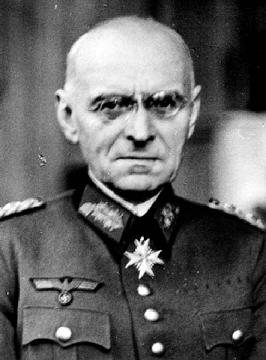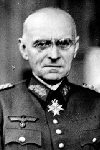Ernst Alexander Alfred Hermann von Falkenhausen, cousin of the Governor-general in Belgium during World War One, was born October 29, 1878 in Blumenthal, Silesia in a family of Prussian landed nobility. Hence, he spent his youth in a roomy country house where valets and maids saw to all his needs.
He attended the gymnasium in Breslau before entering cadet school in Gross-Waldstadt. He embarked on his military career at a rather tender age: in 1897 he already was a sub lieutenant in the Infanterie-Regiment 19 in Oldenburg. Three years later he participated in quelling the Boxer revolt in China as a member of the international expeditionary force. He got interested in the Far East, developing his interest further at the Eastern seminar of Berlin University when he was attending military school. On his return he married Paula von Wedderkop and in 1910 he was attached to the Grosse Generalstab in Berlin. There he learned Japanese and collected information on the expansion of the Japanese sphere of influence in Asia.
Thanks to his knowledge of the Japanese language and Asian politics, it was no coincidence that he was appointed military attaché at the German embassy in Tokyo on March 22, 1912. At the outbreak of World War One he returned to Germany. He fought in Flanders, France and Russia and subsequently ended up in Turkey in 1916 where initially he became chief of staff of the Turkish 2nd Army in the Caucasus and later on chief of staff of 7th Army. In this period he was awarded the highest Prussian decoration ‘Pour le Mérite’ for "distinguished leadership and military planning" during the successful operations against the British army in May 1918.
Following the German capitulation, he remained in the 100,000 strong Reichswehr and was appointed commander of the infantry school in Dresden. He seemed to end his military career there in 1930. In 1934 however, he left for China as military advisor to Chang Kai Check. He restructured the nationalist army. After the outbreak of the Chino-Japanese war, the German Aussenministerium brought immense pressure to bear on him. It was considered not fitting that a German general, retired or not, was training troops against a possibly ally. Therefore, he was recalled to Germany in 1938.
A year later, World War Two broke out. This was his cue to return to active duty. During Fall Gelb, the Netherlands surrendered quickly on May 15 1940. General Von Falkenhausen was appointed military commander. The day after however, Adolf Hitler decided, the Netherlands was not to have a military but a civil administration. At the end of May, He had to hand over his military and civil authority to Reichskommissar Seyss-Inquart and General Christiansen.
Due to the speedy advance of the German forces in Belgium and France, an administration was urgently needed in Belgium and He was given a new chance. On June 1, he was appointed military commander for Belgium and northern France. He retained this function until July 15, 1944. He was 62 years old then. Initially he also had authority over the Grand Duchy of Luxemburg. When Gustav Simon was placed in charge of a civil administration, Von Falkenhausen soon lost his authority.
His task entailed maintaining law and order in the occupied territories. At the same time, He and his staff had to see to it that economic life would be quickly restored to its normal level. That way, not only would the population be kept quiet but the economic potential of Belgium could be made available to the German war effort. He surely was not a real Nazi and he tried to follow a moderate policy but directives from Berlin made this increasingly difficult.
July 18, 1944 the military administration (and so he as well) was replaced by a civil administration headed by Reichskommissar Grohé. A few days later, the general was arrested on suspicion of participation in the conspiracy against Hitler that culminated in the attempt on his life. Von Falkenhausen was not executed, due to lack of evidence but he was imprisoned in various concentration camps including Dachau.
On May 4, 1945, at the liberation of Camp Dachau, he was arrested by the Americans. Until his extradition to Belgium in 1948, he was interned in various prisons and camps. His trial in Belgium was opened on September 25, 1950. He was sentenced to 12 years forced labor for his involvement in the deportation of 25,000 Belgian Jews and the execution of Belgian hostages. He was released after just three weeks and expelled from the country. There he said, convinced as he was of the leniency of his policy and the fortune the Belgians had enjoyed having had him as a governor: "Ingrate Belgique, vous n’aurez pas mes os." (Thankless Belgium, you will not have my bones).
Alexander von Falkenhausen passed away July 31, 1966 in Nassau, Rheinland-Pfalz.
Definitielijst
- capitulation
- Agreement between fighting parties concerning the surrender of a country or an army.
- infantry
- Foot soldiers of a given army.
- Jews
- Middle Eastern people with own religion that lived in Palestine. They distinguished themselves by their strong monotheism and the strict observance of the Law and tradition. During World War 2 the Jewish people were ruthlessly persecuted and annihilated by the German Nazis. . An estimated 6,000,000 Jews were exterminated.
- Nazi
- Abbreviation of a national socialist.
- Regiment
- Part of a division. A division divided into a number of regiments. In the army traditionally the name of the major organised unit of one type of weapon.
- Reichskommissar
- Title of amongst others Arthur Seyss-Inquart, the highest representative of the German authority during the occupation of The Netherlands.
- Reichswehr
- German army during the Weimar republic.
Images
Information
- Article by:
- Gerd Van der Auwera
- Translated by:
- Arnold Palthe
- Published on:
- 19-01-2025
- Feedback?
- Send it!











